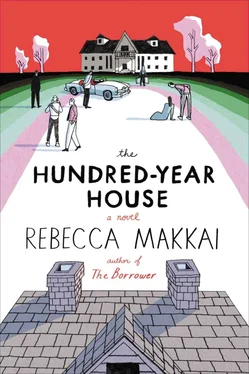The hair just below
Your navel
Curls to the left
Let me untwist it
That was near the top. Farther down, below an unreadable swath:
Lick the scars
Up your knees
Taste what
You drank
And down by the hemline:
I forget to look
In mirrors
My guts have all
Sprung loose
She slapped the dress back down. There was an ugly satisfaction in finding what she’d known she would, despite the sudden light show behind her eyelids that was like the beginning of a migraine, but with a drumbeat.
Zee dragged Hidalgo from the big house. She got saltines from upstairs and sprinkled them all around, behind Miriam’s trays of beads, under her papers. Then she shut him in. He might get free, but not before doing a lot more damage and clawing up the windows. He watched her leave, his eyes black and questioning. “Be bad,” she said.
Her face, her smile, her breathing, would be fine at the coffee shop. If she could smile at Sid Cole, she could smile at Miriam. As she sped to town she developed the leaden sensation, though, that she hadn’t just been right in her fears, but had actually caused something, yet again, to happen. That she’d willed this into being as surely as she’d brought about Cole’s implicit confessions. She was getting everything she wanted, but also — like in a nightmare, where you’re the author and also the victim — she was getting everything she feared: Miriam’s crush, Doug’s ineptitude, even the appearance of that stupid dress. She thought, I need to be careful what I fear next . And then she thought: What I fear next is madness. What I fear next is madness. What I fear next is madness .
I’m so glad we can chat,” Frieda said, though she didn’t sound glad at all. Doug had gone on an absolute tear the past few weeks and finished the two new books, FedExing the diskettes and riding his bike triumphantly home from the post office.
“Something tells me I messed up.” He sat down with the phone base in his lap.
“Well, we can fix it. It’s not unusual that our writers find their voice and start embellishing a bit, and please take that as a compliment. You’re a real writer.”
“It was the eating disorder thing.”
“The problem, in this case, is that it’s the topic of the next book in the series, What’s Eating Molly , which has already been written. And then — the Cece book is wonderful, you really have an ear for her, but we meant for the character of the neighbor to be peripheral. As it is, you’ve fleshed him out so much that I think readers would expect him to return.”
“Right. Okay.”
“What it boils down to, really, is that you’ve made uninvited changes to the world of the story. And you know, a little thing can have huge repercussions down the line. Someone discovers they’re allergic to peanuts, for example, and then five books later—”
“I get it. How long do I have to fix this?”
Frieda sighed — an actual sigh, a rope around Doug’s neck. “At this point, you know, you’ve been fabulous, but we have faster writers, ones who can do this in their sleep. I’m going to bring one of them in, and they’ll split the payment.”
—
Doug was surprised how upset he was. There was the money issue, to be sure, the four thousand dollars he’d counted on cut down to two or less, and there was the ignominy of being, essentially, fired. But moreover he felt a sense of failure, of stupidity. He’d messed up something that should have been a piece of cake. And for what? For trying too hard. When here sat his other project, the real project, for which he’d accomplished nothing at all beyond breaking and entering.
He poured yesterday’s tepid coffee into his thermos. He was searching for milk when he heard Miriam sobbing again, this time from inside the rooms she shared with Case. He was about to make a silent joke about another dead Kennedy when he realized Case was in there with her, that the sobs were covering the rumble of an angry male voice. Doug heard the word disaster , and he heard actually and Texas and forget it . He waited longer than he was comfortable, listened for any reason to break down the door: slaps or crashes or sudden screams. But it was just this torrent of words and crying.
Doug started humming loudly as he dumped in a scoop of sugar and shook the thermos up. He gave words to the humming: This is my cue to leave. This is my cue to leave . Okay, then. He dug in his desk and found the diskettes that were Edwin Parfitt’s prison, and he found the bound copy of his dissertation, and he found last year’s research — Xeroxes and notes and outlines. He stuck them in his bag with the thermos. It had taken a punch in the balls from Frieda and Melissa Hopper, it had taken hysterical Texans spooking him from the house, but he would finally get to work.
And what was more: He was done being a baby. If there were files twenty yards away from him, he was going to help himself. The fund-raiser was a week away, but that was enough time to plan the details. He’d have knocked on Miriam’s door right then to tell her so, if she hadn’t been indisposed. Instead, he headed out the door and into the rain.
In front of a library computer, he spread things out. He borrowed a stapler and some markers from the front desk. By the end of two hours, he had a plan for a new shape to the book, given that something, anything, could be found in the files. Parfitt was famous (if he was famous for anything, which he wasn’t) for periods of hyperproductivity followed by long fallow stretches. This was often attributed to his depression, though Doug had never found any signs of the man’s mood swings other than his offing himself — and Doug wondered if he could piece together some other theory, based on the poet’s time at MacDowell and Laurelfield and his publication schedule. The MacDowell archives were at the Library of Congress, and maybe he’d be allowed access. Those librarians couldn’t be harder to get past than Gracie. And the sickness Parfitt had mentioned in that letter to his niece — there might be something about that in the Laurelfield files. That he’d had to leave early, that he was depressed, that he had some condition like lupus that would have immobilized him for months or years. Perhaps he’d had, like Doug, an invisible troll sitting on his shoulders keeping him from his work — until, one day, the troll hopped off.
As the days grew short, as the ghost stories of the semester piled up in her dreams and (as fifteen-page papers) in her inbox, as she lay awake half the night and walked sleeping through the day, Zee began to wonder if her sanity, her residency in the rational world, wasn’t a thin veneer. Something ready, all along, to crack.
She’d always believed she could read Doug like a book, but apparently this wasn’t true. She hadn’t even known what he was writing. She looked at him in the mornings and wondered who he was.
So what was real? And who was running the show? She used to think she was the one in charge. Now she began to fear this same thing.
She found herself pressing on the kitchen counter to see if it would give way, if it would turn to a liquid or a vapor.
—
The last weeks of November passed in a dull and angry blur. Chantal asked if she was feeling all right. “No,” she said, and walked away.
In the bathroom of the English building, she noticed her arms had grown thin. There she was in the glass above the sink, still visible, fluorescently lit. What had once been a nice, symmetrical face had grown bony and shiny, like a cartoon of an unfortunate stepsister. As she stood at the hand dryer, the tiles on the floor began rearranging themselves, jumping to new spots. No. It was scraps of toilet paper, blown by the hot air.
Читать дальше












